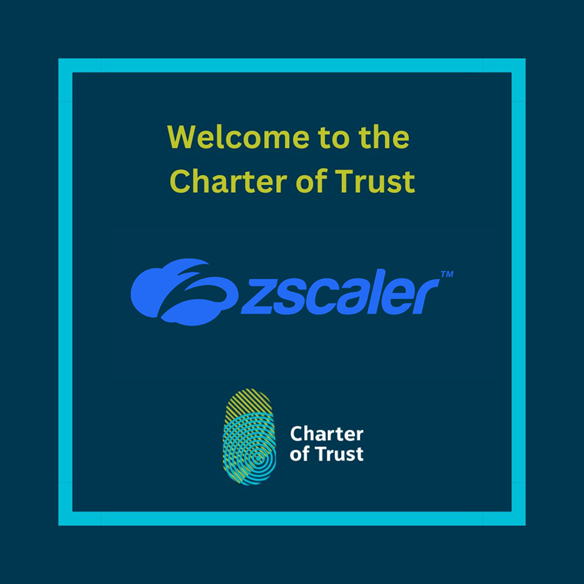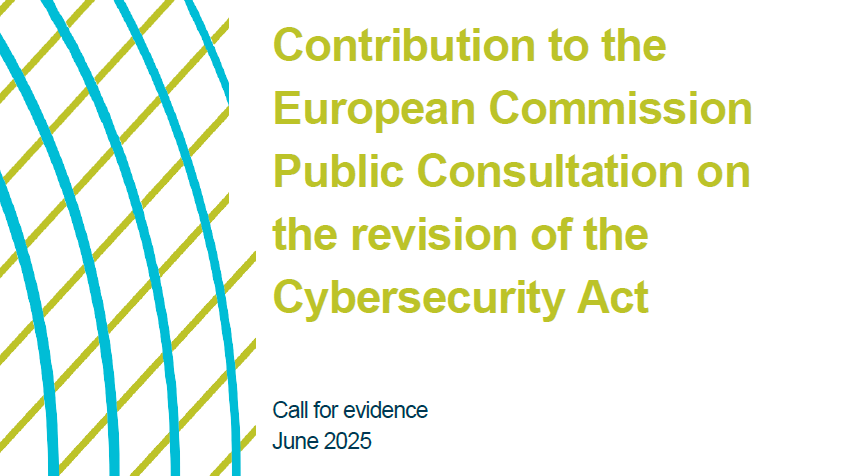The Charter of Trust members include a "who's who" of global brands, all well-known as best in-class – the largest, the most admired, the most sustainable, the best places to work, the most recognized, and now, all are being lauded as companies dedicated to using digitalization as a path for securing the future.
Siemens, and the 11 Charter of Trust members, today welcomed Cisco, Dell Technologies, Total and TÜV SÜD AG to its global cybersecurity initiative during National Infrastructure Week in Washington, D.C.
Siemens President and CEO, Joe Kaeser, was joined at a signing ceremony by Michael Timmeny, SVP & Chief Government Strategy Officer of Cisco; Michael Dell, Chairman & CEO, Dell Technologies; Patrick Pouyanné, Chairman & CEO, Total, and Prof. Dr.-Ing. Axel Stepken, Chairman of the Board of Management of TÜV SÜD AG.
With the theme “Building our future, building our infrastructure,” the 6th annual National Infrastructure Week is a week of events and advocacy to elevate infrastructure as a critical issue impacting America’s economy, society, security and future.
“The Fourth Industrial Revolution is here, and it’s not just about technology,” says Kaeser. “A digital transformation is taking place across industry and society, where physical and virtual worlds are integrated through new technologies like the digital twin, data analytics, 3D printing and artificial intelligence. Today, data is more relevant than ever, but the challenge arises as to securing this data, and the infrastructure that creates it. The Charter of Trust global cybersecurity initiative is designed to prevent harm to people, businesses, infrastructure and assets by establishing a reliable basis upon which the Fourth Industrial Revolution can be built on,” Kaeser added.
The Charter of Trust represents an unprecedented cybersecurity initiative based on ten principles. The Charter of Trust was announced at the Munich Security Conference (MSC) in February, and signed by a group of founding companies, including Airbus, Allianz, Daimler Group, IBM, MSC, NXP, SGS and Deutsche Telekom. During CERAWeek in March, The AES Corporation, Enel and Atos joined the group. The new Charter of Trust members include Cisco, a worldwide technology leader based in San Jose, CA; Dell Technologies (Dell, Dell EMC, Pivotal, RSA, SecureWorks, Virtustream and VMware), which provides essential infrastructure from the edge to the core to the cloud; Total, a French multinational integrated oil and gas company and one of the seven “supermajor” oil companies in the world, and Munich-based TÜV SÜD AG, a leader in testing, inspection and certification services.
“Trust is essential, and for nearly a decade the Cisco Security and Trust Office has operationalized many similar principles as those found in the Charter of Trust,” says John N. Stewart, SVP and Chief Security and Trust Officer, Cisco. “Our company applies strong protections for our customers, employees and stakeholders by embedding security into our solutions, operations and across our value chain, developing and following open global standards, and continuously striving to earn and maintain our customers’ trust every day. In joining the Charter of Trust, we feel that working together with industry peers will accelerate these goals and make the world a better place.”
Michael Dell, Chairman and CEO, Dell Technologies added: “By joining the Charter of Trust and partnering with other leading technology providers, we can help realize the promise of technology innovation to drive human progress while protecting people and securing their data in this digitally connected world.”
“Cyber security is a paramount topic for companies, as cyber-attacks are steadily increasing,” says Patrick Pouyanné, Chairman and CEO, Total. “The consequences of a successful cyber-attack can be extremely harmful: it can impact the safety of our staff and facilities, degrade our finances, reveal the private data of our customers or even damage our reputation. By the nature of its industrial activities and the issues at stake, a company like Total is more than willing to sign The Charter of Trust, whose principles make it an unprecedented cybersecurity initiative.”
“All evolving business ecosystems come along with more digital interaction, deeper value chain integration and ever more interdependencies between participants,” says Prof. Dr.-Ing. Axel Stepken, Chairman of the Board of Management, TÜV SÜD AG. “Cyber security will be crucial to making business reliable, sustainable and secure. We are pleased to be a member of the Charter of Trust and contribute to this initiative by protecting critical systems and large volumes of sensitive data for our customers’ business continuity, building trust in the digital world of today and tomorrow.”
The Charter of Trust members are taking the next steps to define the organization’s structure and take action upon its ten principles, including topics such as ownership of cybersecurity, supply chains, security by default, user-centricity, co-creation, workforce training, certification for critical infrastructure, transparency and response, regulatory framework and joint initiatives.
As a highlight to National Infrastructure Week, cybersecurity experts from industry, government, academia and research gathered together today for a thought leadership event hosted by Bloomberg titled “The Future of Cybersecurity: Risk and Resiliency Across Critical Infrastructure.” Leaders discussed how technology, workforce education and investment are needed to secure tomorrow’s future.


You may also like

Charter of Trust Welcomes Zscaler
Zscaler is a leading cloud enterprise security provider helping global businesses accelerate their digital transformation by becoming more agile, efficient, resilient, and secure.
With Zscaler as a partner in the Charter of Trust, we aim to strengthen global cyber resilience through trust – by fostering actionable collaboration between industry leaders, governments, and public-private platforms. Zscaler brings robust expertise and innovation to the table, making it the ideal partner to drive this mission forward.
“Zscaler is excited to drive meaningful change alongside our new partners, laying a foundation of trust essential for successful digital transformation,” said Sam Curry, Zscaler CISO. “In today’s world, the need for reducing inherent trust and default access has never been greater. To truly stay ahead of ever-evolving threats, we must unite as a coalition of practitioners. Cyber attackers aren’t taking breaks, and with advancements like artificial intelligence, quantum cryptography, and emerging technologies on the horizon, collaboration is the key to securing the future.”
“We are proud to welcome Zscaler to the Charter of Trust. Their focus on cybersecurity innovation and commitment to openness reflect our shared ambition to create a safer, more resilient digital future. Together, we’ll strengthen trust, transparency, and security across the global digital landscape.” highlighted Dr. Summit Chada, Charter of Trust Co-Chair and COO Group Security & Business Lines CISO at Atos.
“With Zscaler as a Partner of the Charter of Trust, we believe that we can strengthen the global commitment to secure digital transformation by combining technological innovation with the Charter of Trust’s collaborative approach to cybersecurity leadership.” Ralf Schneider, Charter of Trust Co-Chair and Senior Fellow and Head of Cybersecurity and NextGenIT Think Tank at Allianz SE, welcomes Zscaler to the Charter of Trust.
We are excited to join forces and work together to advance digital trust and security across industries.

Contribution to the EU Commission Public Consultation on the revision of the Cybersecurity Act
We support Policy Option 2, which focuses on targeted regulatory measures that address key challenges without creating unnecessary complexity. In this context, we emphasize the need to enhance the role and resources of ENISA, to ensure effective implementation of both current legislation and the European Cybersecurity Certification Framework (ECCF).
Our recommendations aim to improve transparency, collaboration, and efficiency across the EU’s cybersecurity landscape. These include:
- Introducing clear timelines for the development of certification schemes.
- Enhancing stakeholder engagement throughout the process.
- Establishing more structured communication channels between ENISA, the Stakeholder Cybersecurity Certification Group (SCCG), and sectoral ISACs (Information Sharing and Analysis Centers).
We call for a stronger ECCF, one that is transparent, inclusive, and aligned with international standards to foster global interoperability and ease compliance for organizations across borders. Equally critical is the harmonization of certification practices across EU member states and the mutual recognition of certifications to minimize regulatory fragmentation.
The Charter of Trust advocates for technically robust, standards-based certification schemes, with well-defined roles and responsibilities. We also stress the need for clarity on the interplay between voluntary and mandatory certifications, particularly in relation to the upcoming Cyber Resilience Act (CRA).
To streamline compliance and reduce administrative burden, we propose a unified, risk-based incident reporting regime that consolidates requirements under regulations such as NIS2, CRA, GDPR, and DORA. This would not only simplify reporting for organizations but also enhance the EU’s overall cyber resilience. In addition, we recommend incorporating liability protections and grace periods for incident disclosure.
Finally, we urge the Commission to strengthen supply chain security by adopting a risk-based classification approach and establishing baseline cybersecurity requirements for ICT suppliers.
The Charter of Trust remains fully committed to supporting the European Commission in shaping a secure, resilient, and trusted digital future for Europe. We look forward to continued collaboration in building a cybersecurity framework that meets the needs of all stakeholders, today and in the years to come.




